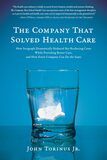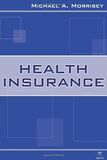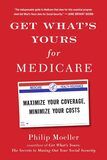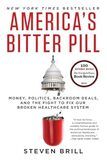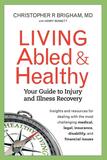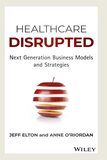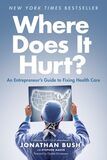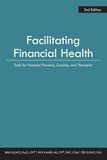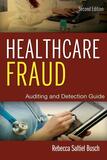Top 10 Health Insurance Books [2025]
Below is the list of the top 10 health insurance books you must read in 2025.
- The Company That Solved Health Care ( Get this book )
- Health Insurance (Get this book)
- Get What’s Yours for Medicare ( Get this book )
- America’s Bitter Pill ( Get this book )
- Living Abled and Healthy ( Get this book )
- Healthcare Disrupted ( Get this book )
- Where Does It Hurt? ( Get this book )
- Facilitating Financial Health ( Get this book )
- Healthcare Fraud: Auditing and Detection Guide ( Get this book )
- The Complete Guide to Veterans’ Benefits ( Get this book )
Let us discuss each health insurance book in detail, along with its key takeaways and reviews.
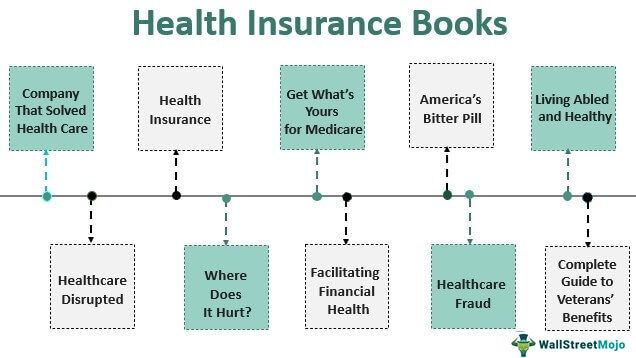
#1 - The Company That Solved Health Care
by Jr. John Torinus
Book Review
This book explains how a US-based company named Serigraph had a growth rate of 15% on its annual health care bill every year. These cost escalations were in danger of bankrupting the company. To significantly lower such costs, the leaders were required to take a radical approach. This book offers practical and costs control solutions for modern business leaders.
As an approach towards turnaround management, Serigraph focussed its strategies on the following three areas:
- Consumer Responsibility
- Primary Care
- Centers of Value
Key Takeaways
Combined with other management methods, these tactics slashed costs while improving the quality of employee care. In numerical terms, the average cost dropped to 2.8%, even below the national average. Hence, the following learnings can be inferred:
- Adopting a consumer-driven plan so that employees can take control of their healthcare
- Ensuring Transparency of prices
- Guiding employees through price complications and leading them to value addition benefits
- Emphasize the usage of primary care to prevent individuals from expensive hospitals
- Complete mastery of consumer protection laws to remedy medical overbilling
- Maximize benefits from the company’s healthcare plans
#2 - Health Insurance
by Michael A. Morrisey
Book Review
In the U.S, the focus of health insurance is looking from the outside and explaining the offered role and benefits. Michael Morrisey, an established health economist, provides a robust but intuitive examination of the issues confronted by insurance companies and how the market and the government have addressed such cases in the past. The emphasis is on understanding the underlying problems from the perspective of economics and applying the empirical literature to provide insight into the solutions' impact and effectiveness.
Key Takeaways
Some of the critical topics covered in this health insurance book are:
- The widespread impact of the 2008 recession on insurance coverage.
- Health savings accounts and consumer-directed health plans.
- The predictive power of risk adjustment.
- Moral hazards associated.
- Role of employer-sponsored health insurance and how one can extract maximum effectiveness.
- Offering a basis for understanding and predicting the effects of the Patient Protection and Affordable Care Act (ACA).
The text is comprehensive and written logically and systematically. The contents have no political biases and clearly outline how the ACA has transformed and the expectations set apart. It is recommended for readers at various stages of their careers.
#3 - Get What's Yours for Medicare
by Philip Moeller
Book Review
Social security offers most retirees income in the U.S., and Medicare guarantees affordable health insurance. However, not all are aware of the minute details provided by the insurance coverage. They would not be aware that the government offers parts of Medicare and how they can function with private insurance plans such as Medicare supplement insurance and medicare advantage.
Key Takeaways
Since health costs are the most significant unknown expense for aging Americans above the age group of 65, a complete understanding and navigation of Medicare is the best way to save Health care Dollars and ensure its practical usage. The healthcare system of the U.S., which is rather bizarre, is one of the biggest causes of bankruptcy in the country, and it is not simplified by a resident turning 65 years old. One requires a complete understanding of the functioning and pitfalls and associated misconceptions. This book is an attempt to cover the same.
The endnotes are highly commended and include deep links to the specific webpage or available information. Relevant statistics are also accompanied.
#4 - America's Bitter Pill
by Steven Brill
Book Review
This book is one of the most acclaimed releases on how the Affordable Care Act, also known as Obamacare, was created, implemented, and evolved. However, the highlight has been how it failed to change and created havoc in the healthcare industry.
The author has emphasized the history of Obamacare and has specified that the root of the U.S. health problem is political. The expenses for the government are ballooning, making the enactment a cumbersome process and the U.S. a system with many profound issues.
Key Takeaways
The first part of this health insurance book states how with a democratic majority in both houses. The lobbyists with unique interests, such as drug companies, insurers, hospitals, device makers, and patients, could force reform to water down proposals and turn such laws in their favor. It will highlight the connection between the power structure and economics prevailing in the country. The significant communication shortages and differences of opinion have been highlighted in this book.
The latter section intersperses the political narrative with stories of individuals who ran into financial catastrophe through illness and what various institutions (hospitals) did to bring these individuals to bankruptcy. The description of the failed launch of the Obamacare website is eye-opening, and how it had a cascading effect throughout. The author states that it is complicated now for the healthcare system to be built from the ground in a way that could minimize costs and maximize effectiveness.
#5 - Living Abled and Healthy
by Christopher R. Brigham-MD & Henry Bennett
Book Review
This health insurance book offers readers guidance for the most challenging times of our lives – when individuals or loved ones are ill or injured and efforts are being taken to recover as completely as possible. It offers insights, knowledge, and resources for challenging medical, legal, insurance, disability, and financial issues. Tackling through the medical and legal system may not be easy, and the answers might not be clear. However, this book, in conjunction with web-based tools, offers the required knowledge and resources.
Key Takeaways
The author highlights a complete understanding of health care education in simple language to the readers. There are essential sections about injuries sustained at work and car accidents, including information on alternate care providers and insurance. One should identify the incomplete or damaged incentives, which can lead to catastrophic and down sliding outcomes for the larger workforce.
All the practical aspects are attempted to be covered and are considered a definite read for someone who is ailing and will return to work after such a difficult phase.
#6 - Healthcare Disrupted
by Jeff Elton & Anne O'Riordan
Book Review
This book is an in-depth look at the disruptive forces driving the change in the healthcare industry. It offers guidance for defining new operating and business models in response to such changes. A critical overview is made to explain how the global healthcare trends are challenging the inherent strategies of the business models, which examines why industry leaders must evolve to stay in line with dynamic standards and new entrants.
After conducting successful primary research, the authors, who are also healthcare experts, provide an informed view of the industry and new emerging business models essential for life science. That, in turn, plays a more significant role in creating more excellent value for healthcare.
Key Takeaways
It gives an insight to the senior leaders and executives from various industries such as pharmaceutical, medical device and diagnostics, health service, and digital technology companies to pause for considering the changing surroundings. It further demonstrates how existing data from electronic medical records or digital media is combined with technology and advanced analytics to fundamentally change how and where healthcare is delivered, bridging the health of the populations and broadening the responsibilities for both.
It further helps in realizing how the delivery of healthcare facilities can significantly improve patient expectations and the value added by the health system.
#7 - Where Does It Hurt?
by Jonathan Bush & Stephen Baker
Book Review
Through this health insurance book, the authors have made a valiant effort to unite various knots in the U.S. healthcare system. Through his personal experiences and humorous writing skills, Jonathan Bush calls for a revolution in this sector to offer customers wider choices, power, freedom, and information at far lower prices. Bush and his team created a software program that eventually became a cloud-based service company that handles electronic medical records, billing, and patient communications for more than 50,000 medical providers around the country.
Key Takeaways
The readers will learn the following -
- How the carefully sculpted government regulations prop up overpriced incumbents and hamper the pace of innovation
- How profit-driven disruptors are damaging the dominance of hospitals by offering routine procedures at lower costs to attract customers
- We are conducting informed choices about the care we receive and pay.
- Digital start-ups that are not well equipped or recognized by the government offer patients new apps and technologies for accessing medical data and taking control of medical care
In conclusion, the author wants Americans to demand more from the providers but simultaneously accept more responsibility for individual health and make informed decisions. Thus, one should take control of the industry, which is central to our lives and economy.
#8 - Facilitating Financial Health
by Brad Klontz, Rick Kahler & Ted Klontz
Book Review
This health insurance book is essential for financial planners since it integrates the fields of psychotherapy, coaching, and financial planning. It blends the internal and emotional aspects of finance with external knowledge of finance, offering these advisors an extensive and robust set of tools for working with clients to create and maintain financial health.
The book also includes a "Decision Tree" with guidelines for making decisions on what time is appropriate for planners to work with internal issues of the clients. It will also highlight when it is suitable to refer clients to therapists or if special attention is required. It will better equip readers to manage clients' emotional and psychological issues concerning money.
Key Takeaways
It is straightforward to understand and hits the core issues of behavior and money. There is a compelling blend for managing money as one should use both emotional and practical approaches and applications. It works as a catalyst for driving positive changes.
#9 - Healthcare Fraud: Auditing and Detection Guide
by Rebecca S. Busch
Book Review
The extensive healthcare system in the U.S. creates a base for fraud and wastage, which leads to the loss of billions of dollars. Therefore, such a guide can be convenient for auditors, fraud investigators, and healthcare managers to detect and prevent the warning signs of possible fraudulent activities within an organization.
Key Takeaways
This book touches on the following points:
- It provides refined information on primary and secondary healthcare, knowledge, and data management on privacy, risk management, and transparency.
- They offer comprehensive guidance on auditing and fraud detection for healthcare providers and firm healthcare plans.
- Examining the necessary background internal auditors should be aware of while auditing healthcare tasks.
Since understanding the system will require a massive amount of data, which is now getting converted into an electronic manner, management of such information is of pivotal importance. Accordingly, steps for prevention have been highlighted to sharpen the skills of an auditor. The authors have effectively stated various cases and methodologies for providing actual audit and investigative tools. It offers an excellent framework illustrating the readers to break down all the pieces in auditing and detecting healthcare fraud.
#10 - The Complete Guide to Veterans' Benefits
by Bruce C Brown
Book Review
Retirement or exit from the military is one of the proudest moments in the life of an American soldier, and they bid farewell to their job with utmost respect and heads held high. Moreover, as a veteran of the U.S. military, one is entitled to multiple benefits, including healthcare, loans, and many other aids for all aspects of life.
Since the author has served in a U.S. Coast guard, one will be able to understand what it takes to be a part of the military and the difficulties of navigating all the government programs and policies.
Key Takeaways
Some of the topics included are:
- Health care
- Disability compensation
- Grants and Scholarships
- Discounts to Military
- Employment and Vocational Rehabilitation
- Hospital facilities to be availed off
When soldiers retire from the military, they must make significant adjustments while navigating to civilian waters. This health insurance book is written clearly and concisely to aid such a transition. It not only states the slew of benefits offered but also follows the steps and directions on applying for and retaining these perks.
